New Delhi (Sputnik) — India and Afghanistan signed a crucial Extradition Treaty to facilitate the exchange of wanted terrorists, which will strengthen their ability to fight it in the future.
Afghanistan President Ashraf Ghani is on a two days visit to India; he met Prime Minister Narendra Modi and held bilateral talks. This is the eighth time that Modi and Ghani have met.
Glad to have met President @ashrafghani in Delhi. We had extensive talks on India-Afghanistan ties. @ARG_AFG pic.twitter.com/5EgOtwEXuN
— Narendra Modi (@narendramodi) September 14, 2016
India and Afghanistan agreed on a number of crucial issues, including jointly fighting the menace of terrorism. Without naming Pakistan, the leaders agreed to discourage the designs of those who support and sponsor terrorism and step up bilateral security cooperation.
PM @narendramodi & Pres.of Afghanistan, Dr. Mohammad Ashraf Ghani witnesses exchange of agreements in New Delhi pic.twitter.com/8XSrqWbiJ4
— MIB India (@MIB_India) September 14, 2016
“Both sides called…to put an end to all sponsorship, support, safe heavens and sanctuaries to terrorists including for those who target Afghanistan and India,” Foreign Secretary S. Jaishankar said during a press conference.
India also assured Afghanistan that it would support its endeavor to bring stability to the country.
“From India’s perspective we conveyed our support for a unified, sovereign, peaceful, democratic and prosperous Afghanistan. We are willing to work more closely with Afghanistan to expand our developmental assistance, especially in terms of capacity and capability building, skill development and the strengthening of institutions. The Prime Minister conveyed to President Ghani that India would offer an additional assistance of one billion dollar to Afghanistan,” Foreign Secretary, S. Jaishnakar said during a press conference after the meeting.
The Foreign Secretary further added that both the leaders had also discussed the, “Supply of affordable medicine and cooperation in solar energy came during the discussions. We have discussed liberalizing the visa regime and also medical tourism.”


